|
|
|
KARRIN ALLYSON
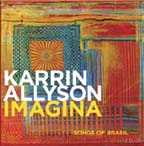 Imagina Imagina
Concord
Records
By Tom Ineck
Like all great song stylists, Karrin
Allyson has instilled in her many fans and friends a sense of personal
relationship over the years, a sense that we know her intimately through
her music. She brings this intimacy to every performance and every
recording. With “Imagina: Songs of Brasil,” her 11th release
on the Concord label, she fully indulges a longtime passion and allows
us to share that passion.
Allyson first revealed her love for the
music of Brazil on her 1992 Concord debut with Jobim’s “Insensatez (How
Insensitive).” The following year she recorded “One Note Samba” and “Dindi,”
and since then she has added “So Danco Samba,” “Corcovado (Quiet
Nights),” “O Pato (The Duck),” “Caracao Vagabundo (My Vagabond Heart)”
and others to her growing repertoire. But this is the first time she has
devoted an entire project to this intoxicating South American music.
It comes as no surprise that Allyson
again has chosen old friends and longtime bandmates to accompany her in
the studio. Guitarist Rod Fleeman’s unique nylon-string technique is
especially noteworthy, and the solid rhythmic component of drummer Todd
Strait has become an essential element of Allyson’s sound. Also
prominently featured are Gil Goldstein on piano and accordion, Steve
Nelson on vibes and marimba, David Finck on bass and Michael Spiro on
assorted percussion.
For the broader understanding of
listeners who do not understand Portuguese, Allyson has thoughtfully
injected English lyrics by several composers, including two by Susannah
McCorkle, two by Gene Lees, one by Jon Hendricks, one by Paul Williams,
and two songs recently adapted by lyricist Chris Caswell, who
collaborated so fruitfully with the singer on her 2006 release,
“Footprints.”
A devoted and accomplished student of
the Portuguese language, Allyson realizes the lush lyrics with her usual
poise and confidence. It is a joy to hear her express all the mixed
emotion inherent in the opening track, “A Felicidade (Happiness),” with
additional English lyrics by McCorkle.
The little-known Jobim composition
“Correnteza” is a revelation in Allyson’s gorgeous reading, and Vinicius
de Moraes’s “Medo De Amar (Surrender the Soul)” is equally stunning. Her
natural ability to combine vulnerability and sensuality makes Allyson
the perfect interpreter of this complex music. That complexity is
illustrated by the delightful “Estrada Branca (This Happy Madness),”
which began its life with a much darker theme than its Lees lyric would
suggest. Likewise, the English lyrics for “Pra Dizer Adeus (Time to Say
Goodbye)” shift the meaning from a suicide note to a lover’s fond
farewell.
Jobim’s first composition, the obscure
title track “Imagina,” is a lilting waltz that benefits greatly from the
blending of Goldstein’s accordion and Nelson’s vibraphone. Fleeman plays
in unison with Allyson’s breezy, scatting vocal on “Vivo Sonhando
(Living on Dreams),” which also features a lyrical solo by Finck.
Here at the Berman Music Foundation,
every new Karrin Allyson release is anxiously anticipated, and “Imagina”
is another great addition to her catalog.
top |
|
|
|
THE VANGUARD JAZZ ORCHESTRA
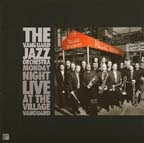 Monday Night Live at the Village Vanguard Monday Night Live at the Village Vanguard
Planet Arts
By Tom Ineck
There is nothing quite like the
visceral wallop of a jazz orchestra in full cry, especially when
heard live in the confines of a small club with a capacity
audience of devoted music lovers. Such is the thrill
experienced—albeit second-hand—while listening to the two-disc
“Monday Night Live at the Village Vanguard,” the latest recorded
document by the Vanguard’s superb “house band.”
That’s one reason that The
Vanguard Jazz Orchestra remains relevant 42 years after it began
its regular Monday Night gig, nearly 30 years after founder Thad
Jones left the band and 18 years after the death of drummer Mel
Lewis, who fronted the band after Jones’ departure. The current
ensemble is more than just heir to the legacy of the Thad
Jones-Mel Lewis Orchestra, and more than just a repository for
the classic compositions of Jones. It is one of the most vital,
exhilarating examples of big-band composition, arrangement and
execution.
“Monday Night” actually is drawn
from performances on Feb. 10-11 (Sunday and Monday), just a few
days before the band’s Feb. 15 appearance at the Lied Center for
Performing Arts here in Lincoln. The intimacy of the venerable
New York City club is an aural counterpoint to the more sterile
environment of the 2,200-seat concert hall.
Aptly, six of the 11 tunes were
composed and arranged by Jones. The first is a long-lost
arrangement of his lilting composition “Mean What You Say.”
Pianist Michael Weiss, who transcribed the original recording
for the big band, sets the stage for trumpeter Scott Wendholt
and tenor saxophonist Ralph Lalama, who play with plenty of
emotion. Terell Stafford on flugelhorn pays tribute to Jones on
“Say it Softly,” again with the original Jones arrangement.
Bob Brookmeyer’s brilliant
arrangement of “St. Louis Blues” gets a 16-minute treatment with
outstanding solos by trombonist Luis Bonilla, trumpeter
Wendholt, alto saxophonist Dick Oatts and pianist Weiss. The
cleverly shifting tempos and stop-time breaks keep things
interesting. Another standard, “Body and Soul,” utilizes a Jerry
Dodgion arrangement for a smoky take by Gary Smulyan on baritone
sax. Lalama returns on tenor for a sustained funk groove on
Jones’ “Mornin’ Reverend.”
Pianist Jim McNeely takes over
on his composition “Las Cucarachas Entran,” a jumping, leaping
little number driven by drummer John Riley and featuring Rich
Perry on tenor sax, and Dick Oatts and Billy Drewes on soprano
saxes. Next up is “Willow Tree,” a Fats Waller tune with echoes
of “Willow Weep for Me.” Bassist Phil Palombi and trumpeter
Staffford inject it with the proper blues power. Dipping into
the pop music world, the band does Jones’ great arrangement of
Stevie Wonder’s “Don’t You Worry ‘Bout a Thing,” which inspires
Oatts to mix the brass colors on soprano sax and piccolo.
John Mosca excels on his
trombone solo during “Kids Are Pretty People,” a soulful
ensemble tune that also has standout solo work by trumpeter
Wendholt and a plunger-muted cadenza by trumpeter Stafford. “The
Waltz You Swang for Me” is a whimsical Jones composition that
does, indeed, swing in waltz time. This time, the solos go to
trombonist Jason Jackson and soprano saxophonist Drewes. The set
closer is “Little Rascal on a Rock,” a Jones favorite that
swings gently with lots of woodwinds and muted brass. Bassist
Palombi solos with aplomb, followed by Smulyan on baritone and
McNeely on piano.
This project would be nothing
but good news if it weren’t for the fact that Dennis Irwin, the
VJO’s bassist for 25 years, died from the effects of a spinal
tumor on March 10, at age 56. The recording is dedicated to him.
Totaling more than 90 minutes on
two discs, “Monday Night” is an accurate representation of a
couple of sets at the Vanguard. Next time you’re in NYC on a
Monday night, make sure it’s on your itinerary.
top |
|
|
|
BRIAN BLADE & THE FELLOWSHIP BAND
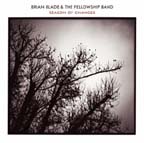 Season of Changes Season of Changes
Verve Records
By Tom Ineck
At long last, drummer Brian
Blade has reassembled his breakthrough Fellowship Band and
revisited its unique sound—a blissful marriage of jazz, folk,
rock and classical elements that is totally devoid of the usual
fusion clichés.
The last we heard from them was
on back-to-back Blue Note recordings—1998’s “Brian Blade
Fellowship” and 2000’s “Perceptual.” We also were fortunate to
experience them in a riveting live performance at the 1998
Kansas City International Jazz Festival.
Returning band members include
keyboard whiz Jon Cowherd, guitarist Kurt Rosenwinkel,
saxophonists Myron Walden and Melvin Butler and bassist Chris
Thomas. The only missing element is Dave Easley, whose pedal
steel guitar use to add another dimension to the
already-eclectic sound. But even without Easley, the Fellowship
Band remains in a league of its own.
Like its predecessors, “Season
of Changes” can bring a listener to tears with its profoundly
beautiful melodies, such as on the opener, “Rubylou’s Lullaby.”
It also can soar on the shimmering waves of Rosenwinkel’s
slippery fretwork, as on the nine-minute Cowherd composition
“Return of the Prodigal Son,” which also sets Butler loose on an
extended Coltrane-like tenor solo.
“Stoner Hill” is a gorgeous
tune, with everyone contributing to the folk-derived melody as
it slowly builds. The 12-minute title track, also penned by
Cowherd, begins with a somber piano introduction of a darkly
classical cast, with tenor sax and bass clarinet adding colors.
Suddenly, Blade kicks it into a rocking tour de force, aided and
abetted by Rosenwinkel. A moody piano-bass counterpoint is at
the heart of “Most Precious One,” which segues into the solid
rock of “Most Precious One (Prodigy),” dominated by Blade’s
backbeat and Rosenwinkel’s fuzz-toned guitar fusillade.
“Improvisation/Alpha and Omega”
has Walden on bass clarinet pairing off with Cowherd on pump
organ for a haunting, introspective piece. The woody, acoustic
tonal quality evokes an ancient, surreal setting, perhaps a
strange worship ceremony in a medieval church. The closer,
Blade’s soaring “Omni,” begins slowly, builds in intensity and
opens to a lovely piano solo before resolving to its haunting
chord changes.
Technically, most of the tunes
are taken at ballad tempos, but they can be deceivingly complex
in their construction, venturing far beyond the safe confines of
smooth jazz or New Age noodling. The music always is
challenging—to musician and listener alike—but never
alienating.
The Fellowship Band has a
powerful group ethic, everyone listening and giving the best
effort for the overall sound. It is the very definition of
fellowship and a refreshing alternative to the ego-driven
projects of many jazz artists.
top |
|
|
|
SAXOPHONE SUMMIT
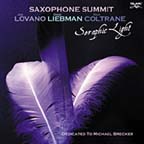 Joe Lovano,
Dave Liebman, Ravi Coltrane Joe Lovano,
Dave Liebman, Ravi Coltrane
Seraphic Light: Dedicated to Michael Brecker
Telarc Jazz
By Tom Ineck
What better way to honor the
memory of the great saxophonist Michael Brecker than a gathering
of Brecker friends Joe Lovano, Dave Liebman and Ravi Coltrane
for a recorded tribute to their fallen comrade? “Seraphic Light”
wonderfully documents that gathering.
Brecker died at age 57 in
January 2007, after a two-year battle with MDS and leukemia. His
final recorded document, “Pilgrimage,” was reviewed in the
January 2008 edition of the Berman Music Foundation newsletter.
To read it, click here.
Bringing diverse influences and
styles to the project, the three saxophonists merge their unique
expressions for a truly moving experience, which was first
exhibited on Saxophone Summit’s 2004 debut recording, “Gathering
of Spirits,” featuring Brecker instead of Coltrane. Since John
Coltrane figured so prominently in Brecker’s playing and in the
formation of Saxophone Summit, it is fitting that the younger
Coltrane, just a year after his mother’s death, has an
opportunity to pay his respects.
Also making significant
contributions are distinguished bandmates Phil Markowitz on
piano, Cecil McBee on bass, Billy Hart on drums, and Randy
Brecker, who is featured on two tracks. Each of them contributed
one composition to the session, as did the three principal
players.
This is an ensemble recording in
which each member plays an integral role, but it remains
primarily a trio statement by three very powerful players.
That’s clear from the opening moments of Markowitz’s
“Transitions,” with Coltrane and Lovano on tenors and Liebman on
soprano sax, harmonizing and playing in unison. Ravi Coltrane’s
“The Thirteenth Floor” brings world music strains to bear with
Liebman on C flute and wooden flute and Lovano on alto clarinet
and Scottish flute. The first ballad comes with “All About You,”
a 1973 tune by McBee that features some heart-stirring tenor by
Coltrane.
Randy Brecker’s contribution is
the frenetic “Message to Mike,” as though the irresistibly
bouncy nature of the tune could reach beyond the grave. “Alpha
and Omega” is Liebman’s offering and he digs into its mysterious
changes on soprano sax, as Lovano swirls high around him on alto
clarinet and Coltrane plumbs the lower depths on tenor sax.
Lovano’s “Our Daily Bread” returns things to a more even keel
and a more hopeful spirit.
The last three tracks—all from
the pen of John Coltrane during his later “free” period, all
arranged by Liebman and all showcasing the tenor sax—are the
most profound statements, as though the Saxophone Summit trio is
calling up the spirits of Coltrane and Brecker. “Cosmos” is a
three-tenor tour de force that delves into Trane’s “sheets of
sound” motif. “Seraphic Light” is a majestic statement with epic
performances by the threesome (Lovano switches from tenor to
double soprano sax for this one) and an absolutely astounding
drum solo by Hart.
“Expression” adds Randy Brecker
to the fray on trumpet for a nearly 10-minute, truly blissful
expression of love for fallen brothers. In a heart-aching
resolution, it ends with Hart rapidly tapping the bass drum
peddle, then suddenly stopping, as if the beating of a heart had
just been cut short—sort of like the untimely loss of John
Coltrane at age 40 and Michael Brecker at age 57.
top |
|
|
|
MARK SHERMAN QUARTET
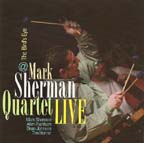 Live
at the Bird’s Eye Live
at the Bird’s Eye
Miles High
Records
By Tom Ineck
We very enthusiastically
reviewed vibraphonist Mark Sherman’s 2005 release, “One Step
Closer,” and his 2007 release, “Family First.” So, it comes as
no surprise that the underappreciated band leader has produced
another gem, this time the double-disc “Live at the Bird’s Eye.”
With just 10 tracks stretching
over 100 minutes across two CDS, the performances crackle with
energy, improvisational zeal and imagination. That is due
largely to the very compatible nature of the superb
foursome—Sherman, pianist Allen Farnham, bassist Dean Johnson
and drummer Tim Horner.
They fly out of the gate on the
opener, a bebop barn-burner called “Tip Top Blues.” Sherman
correctly identifies his lovely mid-tempo composition “The
Winning Life” as “a real band signature type of tune.” It is
indicative of the band’s upbeat mood and the playing is
inspired, especially Farnham’s long exploration of the changes.
“Trust” is an odd polyrhythmic ballad that challenges the rhythm
section to hold down the tricky time as Sherman soars above them
on vibes.
Farnham contributed his gorgeous
ballad “Hope,” and everyone treats it with sensitivity and
personal expression. My personal favorite tune may be the lively
“Hardship,” another crowd-pleaser that draws out the best from
each of the players as they settle into a fast blues groove. It
ends the first CD with gusto.
From “Family First” comes
“Explorations,” a 12-minute paean to the harmonic innovations of
John Coltrane. Horner is especially explosive as he drives the
ensemble throughout and is showcased in a series of drum breaks
as the tune grows in intensity. Sherman dips into the standard
repertoire for the first time with a leaping Latin rendition of
“You Don’t Know What Love Is.” Again, Horner comes on strong,
romping through this one with infectious glee. “There is No
Greater Love” begin at a more relaxed pace, allowing Johnson to
step into the spotlight for a brilliant solo before turning it
over to the rest of the band.
The “Tip Top” theme returns on
“Tip Top Rhythm,” a rhythmically complex exercise for all.
Horner confidently takes his place at the steering wheel,
guaranteeing that none of the players lags behind. Farnham turns
in another virtuosic bop solo, and Johnson. For a well-deserved
encore, the band turns to an old favorite, Henry Mancini’s
romantic ballad “Moon River.”
Throughout this generous live
recording, the quartet exhibits an artistic compatibility and a
genuine love of the music, and the audience responds
accordingly.
top |
|
|
|
FRANK KIMBROUGH
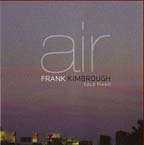 Air Air
Palmetto
Records
By Tom Ineck
“Air” is Frank Kimbrough’s third
release on Palmetto and—oddly—his first solo piano project in 20
years of recording. It is an exquisite portrait of this amazing
player, whose lyrical style has been compared with Keith
Jarrett, Bill Evans, Brad Mehldau and the rest of the usual
suspects. Still, Kimbrough is underappreciated for his vast
technique, tasteful execution and singular sound.
As a sideman, his list of
credits is long and illustrious, including stints with singer
Kendra Shank and in Maria Schneider’s big band. He appeared in
Lincoln with both artists last year. He also has performed and
recorded with various members of the Jazz Composers Collective,
a group he co-founded in 1992 to allow the young artists more
creative expression.
A formidable composer, Kimbrough
wrote five of the nine tracks here. But he also pays his
respects to the works of others, including the opener, “It
Should’ve Happened a Long Time Ago,” a dark, classically
constructed piece by drummer Paul Motian. The pianist’s unique
sense of space and time is beautifully illustrated in this
stirring rendition.
Thelonious Monk gets the nod
twice, starting with “Coming on the Hudson,” on which Kimbrough
explores melodic variations over a bass ostinato. In a very slow
arrangement of Monk’s “Jackie-ing,” the odd chords echo and the
notes shimmer. Duke Ellington’s “Wig Wise” gets a subtly bluesy
reading as Kimbrough constructs a series of subplots, finally
descending to the final note.
Kimbrough’s own “Quickening”
owes something to Monk’s quirky rhythmic approach, but it also
allows the composer a harmonic flight into the more esoteric
territory of Jarrett, or perhaps Cecil Taylor. The title track
has plenty of the “space” implied in the title, as Kimbrough
seems to feel his way emotionally from one change to the next.
Despite its title, Kimbrough
transforms “Three Chords” into a rich musical tapestry. “The
Spins” does, indeed, seem to spin in a kind of twisted waltz
time. The syncopated “Ca’lina” is, no doubt, Kimbrough’s
affectionate and downright joyful tribute to his Carolina home.
Occasionally, Kimbrough’s
mournful interludes can evoke sadness in a sensitive listener.
Under the circumstances, perhaps it is relevant to note that the
North Carolina native—who has called New York City home since
1983—is a passionate opponent of the Iraq War. In the liner
notes, he thanks the many musicians “who have touched and
inspired me, and perhaps even preserved some portion of my
sanity in an increasingly insane world.”
With his own music, Kimbrough
brings much sanity to a world in dire need.
top |
|
|
|
JOHN MOULDER
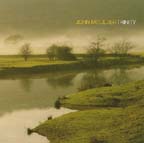 Trinity Trinity
Origin
Records
By Tom Ineck
Guitarist John Moulder’s latest
CD actually was released in 2006, but it has taken this long for
me to come to grips with this extraordinary recording. It does
not fit neatly into any stylistic category. Its performances do
not swing in any traditional sense. It contains no familiar
melodies, and its 13 tracks are sequenced thematically and range
from snippets of less than a minute to extended explorations of
seven or eight minutes.
I found myself returning again
and again to its haunting theme—expressed thusly by Moulder in
the liner notes: “God’s love for humanity and our sharing in
divine life is a luminous mystery… ‘Trinity’ is my musical
interpretation of our journey in God from the primordial to the
eternal.”
Far from being a proselytizing
religious tract masquerading in the thin guise of innocuous
music, “Trinity” is an inspired and inspiring exploration of
musical moods richly orchestrated and beautifully performed by
an unusual ensemble of musicians. Aptly, it is divided into
three parts, each with three compositions—beginning with
“Chaos,” “Creation” and “Exodus,” continuing with “Incarnation,”
“Proclamation of the Unexpected” and “Sorrowful Mysteries” and
ending with “Pieta,” “Resurrection” and “Freedom.” But a
listener need not be aware of the titles or the thematic content
to enjoy this stunningly beautiful and diverse music.
Among the most notable featured
players are Oregon’s Paul McCandless on English horn and bass
clarinet; pianist Laurence Hobgood, singer Kurt Elling’s regular
keyboardist; and drummer Paul Wertico, who has been long
associated with Pat Metheny.
“Chaos” does, indeed,
disintegrate into chaotic disharmony, but “Creation” rises from
the rubble with a lush flugelhorn solo by Tito Carrillo and some
stinging, searching acoustic guitar lines by Moulder, all held
together by the rest of the ensemble. “Exodus” is an odd-ball
blues with some great unison lines by Moulder on electric guitar
and Ken Hall on vibraphone. Hobgood’s piano solo gets strong
support from bassist Eric Hochberg and drummer Eric Montzka
before Moulder comes charging back with another solo statement.
McCandless enters on English
horn with exquisite poise on the ballad “Incarnation,” creating
a pastoral, peaceful mood. Wertico and bassist Kelly Sill drive
the swinging “Proclamation,” the closest thing here to a
conventional post-bop composition. McCandless returns on
“Sorrowful Mysteries” with the haunting mournfulness of the bass
clarinet as the perfect foil for Moulder’s deeply smoldering
guitar.
“Pieta” is a gorgeous ballad
duet with Moulder playing the chord changes on acoustic guitar
and McCandless on English horn soaring high. A tinge of gospel
piano introduces “Resurrection,” which seems to rise from a
simple ballad to a yearning ensemble piece featuring Carrillo on
flugelhorn, Jim Gailloreto on alto flute and Geof Bradfield on
soprano sax, along with the rhythm section. With Wertico’s
breezy march rhythm and Moulder’s bluesy electric guitar and
multi-tracked dobro and acoustic guitar, “Freedom” completes
“Trinity” with a sense of exhilaration, if not exaltation.
Stylistic hair-splitters may
accuse Moulder of veering too close to New Age or jazz-rock
fusion—depending on which track they’re referring to—but I
prefer to think of “Trinity” simply as an ambitious,
well-realized project that shows Moulder is not only a
passionate composer but a talented guitarist, arranger and
bandleader, regardless of the mood he’s in.
top |
|
|
|
JAMES CARTER
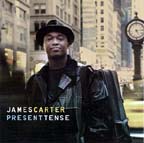 Present
Tense Present
Tense
EmArcy
Records
By Tom Ineck
The music of James Carter is
characterized by a prodigious technique on all reed instruments,
coupled with a hard bop edge, a bluesy attitude and a
willingness to stretch beyond conventional jazz to create a
truly exciting listening experience.
So it is with his latest
release, “Present Tense,” an aptly named project that impresses
from the get-go as an in-the-moment, no-holds-barred throw-down
involving a very compatible group of like-minded musicians. Just
listen to the opening track, Dave Burns’ “Rapid Shave,” and see
what I mean. Carter blows a mean baritone sax while pianist D.D.
Jackson roves and slams the keyboard in a style reminiscent of
Don Pullen.
The tempo slows for the start of
Carter’s “Bro. Dolphy,” but the music is as adventurous as ever,
with the composer—on bass clarinet—paying tribute to the
iconoclastic genius of the title. Trumpeter Dwight Adams enters
with a fury as the tempo increases to a frenzied pace.
Django Reinhardt’s “Pour Que Ma
Vie Demeure” gets a true ballad treatment, with Carter switching
to soprano sax for a Sidney Bechet-style sound. A lovely bass
solo by James Genus and some understated piano work by Jackson
is followed by a virtuosic solo by Carter, who eventually hits
and holds a stratospheric note to the end. Guitarist Rodney
Jones enters the fray for Carter’s “Sussa Nita,” which swings
with a mid-tempo Latin feel. Carter, on tenor sax, employs his
most burnished, full-bodied tone to give it the emotional thrust
it requires.
The Victor Young standard “Song
of Delilah” is turned into a funky tour de force pitting Carter
on tenor sax against Adams’ trumpet as drummer Victor Lewis
provides the essential rhythmic anchor and Jackson contributes
his dazzling pianistics. Jackson states the introduction to the
breezy “Dodo’s Bounce,” by Dodo Marmarosa. Carter on flute and
Adams on Harmon-muted trumpet are delightful sparring partners
on this whimsical number, with Lewis swinging lightly on brushes
and occasional kick-drum punctuation. Jones delivers a lively
guitar solo.
“Shadowy Sands,” by Jimmy Jones,
exudes an exotic Latin rhythm, and Carter’s outrageous bass
clarinet performance heightens the exotica with its deep, woody
tones. Adams adds a crisply constructed flugelhorn solo as
Lewis, percussionist Eli Fountain, Jackson and Genus urge him
on. All the stops come out for Gigi Gryce’s classic “Hymn of the
Orient,” taken at a furious tempo and featuring Carter wailing
on baritone sax. Adams and Jackson also turn in dazzling solos
before everyone trades fours with Lewis in a spectacular display
of musicianship.
Carter’s “Bossa J.C.” lightens
the proceedings somewhat with its soulful tenor sax, acoustic
guitar and assorted percussion instruments, but Lewis pours it
on with his crackling drum work, and Adams on flugelhorn gives
the tune an edge. Again on baritone, Carter caresses the
harmonies on “Tenderly,” the familiar melody of which is stated
on muted trumpet by Adams, who also gets a lengthy,
well-deserved solo spot before the leader shows his stuff in a
wide-ranging solo on the big horn.
With “Present Tense,” his first
release in three years, James Carter reaffirms his status among
the greatest jazz saxophonists of all time.
top |
|
|
|
ED REED
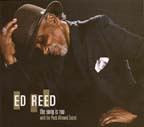 The
Song Is You The
Song Is You
Blue Shorts
Records
By Tom Ineck
From the opening salvo of the
title track, we know that singer Ed Reed is not simply reprising
his momentous debut recording of last year, a gorgeous
collection of ballads called “Ed Reed Sings Love Stories.” (For
a review of that CD, click here).
The performance is a powerful,
joyous reading of the popular standard, with Russell George
adding the unconventional sound of jazz violin to the tonal
palette. In fact, George plays the introduction on the second
track, a lush version of Ellington’s “It Shouldn’t Happen to a
Dream.”
What is consistent with “Love
Stories” is the prominent role of multi-talented,
multi-instrumentalist Peck Allmond, featured on trumpet, tenor
sax, flues, cornet and clarinet. The rest of Allmond’s backing
sextet includes guitarist Jamie Fox, pianist Gary Fisher,
bassist Doug Weiss and drummer Willard Dyson.
At nearly 80 years of age, Reed
continues to amaze with his unique tone, broad range,
near-perfect intonation and unusual phrasing. The 13 tracks vary
greatly in tempo, length and style, but Reed maintains a
confident attitude.
“Where or When” lightly swings
in mid-tempo for nine minutes. Reed duets beautifully with Fox’s
guitar accompaniment on the brief “I’m Through With Love.”
Ellington’s “All Too Soon” gets a relaxed treatment highlighted
by brief statements from Allmond on tenor sax, George on violin,
Fox on guitar and Fisher on piano.
Reed returns frequently to his
forte—the romantic ballad—with “I Get Along Without You Very
Well,” “Don’t Like Goodbyes,” and “It Never Entered My Mind.” In
all, the Ellington songbook yields four tunes here, including “I
Didn’t Know About You” and “Don’t You Know I Care,” where the
singer stretches the phrases caressingly to a mellow Latin
rhythm.
Considering his new-found fame,
Reed seems to state the obvious with an ebullient take on “Lucky
to be Me” and the philosophical reflection of “Here’s to Life.”
With nearly 70 minutes worth of
music, “The Song Is You” is a generous sampling of Ed Reed. With
two recordings in two years, the San Francisco-based
septuagenarian seems to be making up for lost time.
top |
|
|
|
THE DAVID FINCK QUARTET
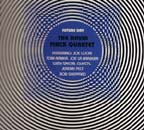 Future
Day Future
Day
Soundbrush
Records
By Tom Ineck
It’s hard to believe that
“Future Day” is bassist David Finck’s debut recording as a
leader. Stretching back nearly 30 years, he has been the bass
player of choice for the likes of Mark Murphy, Rosemary Clooney,
Phil Woods, Eddie Daniels, Paquito D’Rivera, Claudio Roditi,
Harry Connick Jr., Sheila Jordan, Natalie Cole, Gladys Knight,
Rod Stewart and dozens of others in the jazz and pop world.
It’s about time, and Finck makes
the most of it. For “Future Day,” he has chosen a stellar lineup
that includes the prolific and immensely talented vibraphonist
Joe Locke, pianist Tom Ranier, and drummer Joe La Barbera, with
additional support from special guests Jeremy Pelt on trumpet
and Bob Sheppard on saxophones.
All four of the principals
contribute compositions, making this a pretty democratic affair.
Ranier’s hip, brooding “I Know” opens the project and
demonstrates how well this quartet works together, especially
the unique harmonizing between piano and vibes. Finck’s “New
Valley” is a breezy jazz waltz with some brilliant bass
interpolations and a brief, but lyrical solo by the composer.
The evergreen “Nature Boy” gets a new coat of paint in 5/4 time.
Pelt and Sheppard lock in with
Locke on the melody of the hard-charging, flag-waver “Four
Flags.” Pelt takes the first solo, followed by Locke and
Sheppard, before the tune comes to an abrupt stop after less
then three minutes. Roger Davidson’s “Ballad for a Future Day”
is the stunning centerpiece, with its gorgeous chord changes,
the quartet’s sensitive interplay, and Finck’s absolutely
beautiful bowed bass solo.
Wayne Shorter’s “Black Eyes”
again provides a vehicle for the piano-vibes harmonies and,
especially for Ranier’s imaginative and confident playing. Pelt
on muted horn and Sheppard on soprano sax return for Finck’s
clever stop-time Latin swinger “Look at You.” Always a
heart-render, “For All We Know” is taken at a very slow ballad
tempo, which Locke expertly caresses with long vibrato-rich
lines before passing it to Ranier for a tender solo.
The drummer’s contribution is a
lilting little number called “If Not For You.” After Locke
states the theme, Finck digs in with a note-perfect solo,
followed by solos by Locke and Ranier and some very nifty drum
breaks. Locke’s “Appointment in Orvieto” is a rhythmically and
harmonically challenging tune that the composer sails through
with aplomb as the tempo accelerates. In fact, the whole band
seems inspired here.
Ranier also penned the lightly
swinging “Transparency,” with La Barbera showing his skill on
brushes. The uptempo Cedar Walton tune “Firm Roots” closes the
set with gusto. With “Future Day,” the David Finck Quartet is
deserving of an encore.
top |
|
|
|
DELIRIUM BLUES PROJECT
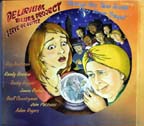 Serve
or Suffer Serve
or Suffer
Half Note
Records
By Tom Ineck
Delirium Blues Project is the
brainchild of pianist Kenny Werner and singer Roseanna Vitro.
Once you get past the gimmicky concept, this live recording has
real merit. While not a straight jazz recording, it does
contains some exciting performances by jazz masters of their
instruments, including trumpeter Randy Brecker, tenor
saxophonist James Carter, trombonist Ray Anderson, bassist John
Patitucci and guitarist Adam Rogers, plus the lesser-known but
equally capable Geoff Countryman on baritone sax and Rocky
Bryant on drums.
Recorded at the Blue Note in New
York in August 2007, “Serve or Suffer” is a bluesy session
featuring an interesting mixture of pop and soul material with
innovative Werner arrangements and heartfelt playing. The
listener gets a good idea of what he’s in for with the opener, a
new take on the old Tower of Power classic “What Is Hip?” that
derives from the fusion influences of Miles Davis, Weather
Report and Return to Forever, with a smoking solo by Rogers.
Vitro deserves kudos for her
choice of the obscure, but wonderful “Goodnight Nelda Grebe, the
Telephone Company Has Cut Us Off,” from the 1968 release “Living
with the Animals,” by the eclectic rock band Mother Earth,
fronted by singer Tracy Nelson. The original lasts less than
three minutes, but here stretches beyond nine minutes, with
pumping horns, rock-solid rhythm and Vitro’s soulful vocalizing.
“Blue” receives a lush, romantic take, with smoky nightclub
piano and a very hip, moaning tenor solo by Carter.
Joni Mitchell gets her due when
Vitro pays tribute with “Be Cool.” Rogers rips off another hot
solo, this time sounding a bit like Larry Carlton. Another
well-deserving tune is “Half Moon,” best known for Janis
Joplin’s early ‘70s version. Here it is a showcase for the horn
section and Vitro’s smoldering delivery, much more restrained
than Joplin’s wail.
“Cheater Man” is Vitro at her
bluesiest, and the horns delve again into the punchy Tower of
Power sound. Mose Allison’s “Everybody’s Cryin’ Mercy,” one of
the great indictments of hypocrisy, gets another worthy
interpretation, and Anderson’s mournful, plunger-muted solo is
the highlight.
The music is so much fun that
Werner and Vitro can be forgiven the pretensions of “Serve or
Suffer,” which include comic-book artwork, blurbs promising
“True Thrills!”, “Madly Popular!” and “Fearless Musicians!” and
a statement that all the music was “conjured live at the Blue
Note.” The music is its own justification and doesn’t require
hype.
top |
|
|
|
RAVE TESAR TRIO
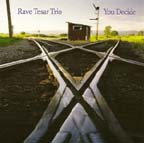 You
Decide You
Decide
Tesar Music
By Tom Ineck
Even after nearly 40 years
listening to jazz and more than 20 years writing about it, I
still get an occasional thrill when a fabulous new artist hits
the scene. Pianist Rave Tesar is the latest favorite, and his
debut as a leader is a gem. The fact that “You Decide” is on
Tesar’s own label and features his brother Bill on drums adds to
the intrigue. Who is this guy?
Tesar’s compositions and
keyboard style come from the vastly influential Bill Evans
school, but with more modern harmonic and rhythmic excursions.
The result is a set of 10 beautifully realized pieces of clever
construction (“The Scale Song”), tenderness (“Minor Mood”), and
dazzling technique (“Have Some More”).
The title track is a brooding,
mysterious eight-minute exploration of chord changes and
harmony. “The Vision” is a driving, rambunctious tune, while
“Everyone But Me” lilts along in witty, care-free fashion.
“Nobody’s at Nobody’s” struts in a soulful mood, reminiscent of
Bobby Timmons or Les McCann and features a wonderful solo
statement by bassist Kermit Driscoll. “Someone Else’s Spell” is,
indeed, a spell-binding, impressionistic foray that begs
comparison with the best of Keith Jarrett.
Rave and brother Bill work
together well on the Latin romp “Midas,” and “Helium,” the
finale, is an uptempo workout for the entire trio, again
displaying their sure sense of three-way interplay.
Throughout the recording,
Driscoll, who has recorded with such innovative jazz artists as
Bill Frisell, John Zorn, Wayne Horvitz and Henry Kaiser, adds an
improvisational edge that acts as the glue that binds the Tesars
together.
By the way, a little research
reveals that Tesar is a New York-based pianist, composer,
recording engineer and producer who has been active in the pop
and jazz worlds since the early 1980s, one who obviously has not
gotten the recording opportunities as a leader that he deserves.
Brother Bill Tesar has performed with Angela Bofill, Bob Berg
and Mark Feldman.
I’ve already decided. Rave
Tesar’s debut recording is a joy to listen to. But don’t believe
me. Track down the CD, buy it and “You Decide.”
top |
|
|
|
RAYA YARBROUGH
 Raya
Yarbrough Raya
Yarbrough
Telarc
Records
By Tom Ineck
My first impression of Raya
Yarbrough was that, at best, her vocal style is an acquired
taste that I hadn’t yet acquired. At worst, I thought, the
Southern California-based singer is just another mediocre talent
hoping for the kind of instant crossover stardom that Norah
Jones achieved with her recording debut in 2002.
After half a dozen listens,
however, I’m convinced that Yarbrough’s self-titled, major label
debut is the real deal and that she is a genuinely gifted
songstress with a unique approach to the music. Like Jones, she
has a lovely voice, mixes genres and writes and arranges much of
her music and lyrics (she penned eight of the 12 tracks here).
But she also appreciates the standards without slavishly
adhering to the “acceptable” ways of interpreting them.
“Lord Knows I Would” is a
soulful opener with a gospel tinge and folk instrumentation, and
“Your So Bad for Me” employs a reggae beat. Yarbrough’s
rendition of “Joy Spring” breaks the mold as she whispers the
lyrics to a moody rock beat before a string section and electric
guitar enter the picture. The result is a fascinating new look
at an old evergreen.
“Dreamer’s Ball” is a somewhat
understated acoustic blues, with Takeshi Akimoto on rhythm
guitar. A gospel choir enhances the traditional sound and
Akimoto cuts loose with a nifty solo. All the while, Yarbrough
and the harmony voices interact with satisfying results.
“Sorrow’s Eyes” is a jazz waltz with the Yarbrough lyric, “If it
holds true that love’s eyes are blind, sorrow’s eyes are wide
open. If your lonely eyes are open, hold me in your sight for
awhile.”
First-time listeners may not
immediately identify Yarbrough’s imaginative take on “Mood
Indigo,” with her voice initially accompanied by bass only. It
soon becomes apparent as the rest of the band chimes in. The
sole remaining standard, “Early Autumn,” gets a more
conventional, if mournful, reading from Yarbrough, and she is
backed by a string quartet that gives the performance the feel
of a classical tone poem.
“Hollywood Love” is a dreamy
Latin number, with subtle horns and percussion setting the mood
as Yarbrough’s voice soars above. The singer shows her
considerable skill at the piano on “’Round We Go,” which has an
irresistible rumba beat. “Vice and Vanity” also utilizes a Latin
rhythm, but the music is less interesting. The closer, “Better
Days,” is a cleverly constructed tune with rapid-fire lyrics and
a hip-hop attitude, but the chorus is strangely appealing.
top |
|
|
|
THOM ROTELLA 4-TET
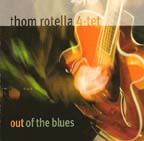 Out
of the Blues Out
of the Blues
Four Bar
Music
By Tom Ineck
Too many of guitarist Thom
Rotella’s previous recordings left me cold with their
light-weight, so-called “smooth” jazz sound, so “Out of the
Blues” came as a pleasant surprise. For this 2007 release, he
largely eschews the forgettable melodies and lackluster
performance for a set of standards and bluesy Rotella originals
played with a sense of urgency, and the result is very hip and
very enjoyable.
It doesn’t hurt that the
guitarist has gathered around him a group of very capable
players—pianists Llew Matthews and Rich Eames, bassist Luther
Hughes and legendary bop drummer Roy McCurdy. They perfectly
complement his Wes Montgomery-style fretwork.
The Montgomery influence is
evident from the outset, Rotella’s swinger “Who Dat?” where he
employs the familiar octave chords to great effect. The blues
and the wordplay continue on “Bluze 4 Youze,” a more
conventional blues shuffle with nice keyboard comping by
Matthews. Hughes, best known for his long tenure with bluesy
jazz pianist Gene Harris, provides a solid walking bass line and
takes a tasty solo.
“My Foolish Heart” is one of
three standards included, and it gets the ultra-romantic
treatment, with long and lush lines at a very relaxed tempo.
Rotella and Matthews trade solos, while Hughes and McCurdy, on
brushes, assist with admirable skill and sensitivity. “The Dr.
Is In” returns to the bluesy Montgomery references at a quicker
tempo, and “Never Say Goodbye” evokes a dreamy Latin world with
excellent mallet work by McCurdy and Rotella’s languorous,
single-note lines and alternating chords.
Jerome Kern’s timeless “The Way
You Look Tonight,” is taken at a medium tempo that emphasizes
the tune’s gorgeous melody and danceable waltz tempo. While
Rotella and Eames trip the light fantastic, Hughes and McCurdy
shine in their essential supporting roles, especially McCurdy in
his brilliantly brush-stroked solo. The band briefly switches to
a lilting Latin beat for “All Ways,” then returns to more
familiar ground on the swinging standard “I Hear a Rhapsody,”
which features a passage of four-bar breaks that display the
quartet’s compatibility.
“Shimmer” is a lush ballad by
Rotella that reflects the dappled sunlight-on-water imagery of
its title. The guitarist sets the mood, and Eames delivers a
similarly shimmering solo. The bouncy Latin closer, “Be Here
Now,” contains some unusual chord changes that resolve into a
fairly conventional melody.
Here’s hoping that Rotella
continues to pursue the true jazz muse, such as he does on “Out
of the Blues.”
top |
|
|
|
BOBBY HUTCHERSON
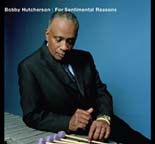 For
Sentimental Reasons For
Sentimental Reasons
Kind of Blue Records
By Tom Ineck
With the death of Milt Jackson in 1999, there are few
vibraphonists who can assume the title of current master of that
instrument. Joe Locke, Stefon Harris and Gary Burton certainly
rank very highly, but it is Bobby Hutcherson alone who rises to
the stature of “Bags.” The fact that this is only his third
recording in the last 14 years makes “For Sentimental Reasons”
especially significant.
It
also is a gorgeous collection of classic love songs, from the
light romantic to the heart-breaking, from the hope of tomorrow
to the wistful regret of yesterday. Hutcherson elegantly paces
himself, faithful to the original melodies, yet embellishing
them with his trademark harmonic exploration. The 11 tracks
generally alternate between ballads and mid-tempo tunes.
Hutcherson’s perfectly suited partners are pianist Renee Rosnes,
bassist Dwayne Burno and drummer Al Foster.
The
quartet sets the tone for the entire project with a lush, yet
relaxed reading of the opener, “(I Love You) For Sentimental
Reasons.” “Ode to Angela,” a lovely piece by the late
saxophonist Harold Land, is a harmonic gem capped by a wonderful
Rosnes solo. Gershwin’s “Embraceable You” is taken at a very
slow tempo and again features a breathlessly beautiful harmonic
interaction between vibes and piano.
The
vibes prance delightfully through the Benny Golson standard
“Along Came Betty,” lightening the outlook before the CD’s
stately masterpiece, Leonard Bernstein’s yearning “Somewhere,”
played as a duet between Hutcherson and Rosnes. “Jitterbug
Waltz” begins slowly but soon leaps into dance-time in its
familiar, cascading melody.
Hutcherson and crew avoid the risk of sappy melodrama on Michel
Legrand’s “What Are You Doing the Rest of Your Life?” Burno
deftly walks the bass on a light-hearted version of “Don’t Blame
Me,” which contains some of Hutcherson’s most imaginative
playing. Foster sits out on the tender, uplifting “Spring Is
Here.” The drummer returns with a snappy Latin beat to drive “I
Wish I Knew,” and Hutcherson takes it home with a solo rendition
of the classic farewell song, “I’ll Be Seeing You.”
As
with any recorded document of a great jazz artist at his peak,
“For Sentimental Reasons” reaches listeners at a depth more
profound than the mere musical notes involved.
“As
much as any great creative artist who has ever touched our
hearts in the inner space of a story or a song, Bobby Hutcherson
helps us to more readily welcome and celebrate the seemingly
endless contradictions, polarities, and paradoxes of life,”
writes Todd Barkan. “From Bobby’s swinging music, our souls
learn an important little bit more about loving the whole
spectrum of happy and sad and hopeful and mad that makes our
brief time in this realm of day and night and clay and light a
lot more worth living.”
top |
|
|
|
JAZZCODE WITH CARL STORMER
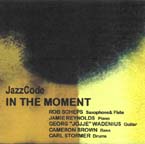 In
the Moment In
the Moment
By Tom Ineck
While drummer Carl Stormer is the nominal leader of JazzCode,
the quintet actually is a classic jazz democracy ruled by five
masterful musicians whose individual artistry serves the greater
good.
The
resulting music is, indeed, a great and good thing, a
collaborative effort documented in one day back in June 2007 at
Rainbow Studio in Oslo, Norway. The choice of material is
brilliant, the arrangements revelatory and the improvisation
seemingly effortless, the kind of combination that is achieved
only in the company of like minds who are truly “in the moment.”
Stormer is the conceptual genius and rhythmic anchor behind reed
player Rob Scheps, pianist Jamie Reynolds, guitarist Georg
Wadenius, and bassist Cameron Brown. If anyone truly dominates
this recording it is Scheps, whose versatility, technique and
imagination make him a constant presence and a formidable
soloist. Take his bright, swinging tenor saxophone on the
opener, Frank Loesser’s “I’ve Never Been in Love Before.” He
sets the tone and the others deliver on his promise, especially
Brown’s lyrical bass solo.
One
of many highlights here is the JazzCode version of “She’s
Leaving Home,” that sad Lennon-McCartney ballad of ‘60s teenage
angst. Scheps weaves gorgeous flute lines around the lovely
guitar work of Wadenius. Returning to more traditional jazz
repertoire, Scheps takes up the tenor for a lush, yearning
reading of “You’ve Changed,” with Reynolds, Brown and Stormer
(on brushes) simply creating a frame for his painterly
expressionism.
Rock balladry again proves a goldmine with “Wild Horses,” the
Jagger-Richards classic . Scheps wails on an extended, climactic
tenor solo. The Cole Porter evergreen “My Heart Belongs to
Daddy” gets a clever, swinging Latin treatment, aided and
abetted by Stormer’s percussion, Wadenius’ guitar solo and
Reynold’s inventive keyboard comping. Scheps again steps into
the spotlight with a brawny, honking tenor solo.
If
you think that Gershwin’s “Summertime” has been done to death,
lend an ear to the JazzCode bluesy take, which revolves on a
repetitive piano riff that suggests new harmonic possibilities.
In his solo, Reynolds takes full advantage of those
possibilities, and Scheps deftly states the theme. Marvin Gaye’s
“What’s Going On” gets a faithful, funky arrangement,
highlighted by Scheps’ “greasy” tenor sax excursions, a Reynolds
solo loaded with block chords and Stormer’s aptly lively
drumming.
The
biggest surprise here is the absolutely gorgeous rendition of
Madonna’s “Take a Bow,” which Scheps sits out. Reynolds and
Brown are the stars, with the pianist and bassist sensitively
playing off each other’s ideas. Scheps returns with a vengeance
on Coltrane’s hard-bop blues tune, “Traneing It,” also featuring
solos by Reynolds and Brown. Jobim’s languorous samba
“Corcovado” is handled with grace and delicacy as Scheps
switches to flute, Wadenius contributes subtle rhythm guitar and
Stormer punctuates on the wood block. Reynolds caps the tune
with another wonderful, yet understated solo.
Jerome Kern’s standard “The Way You Look Tonight” is given a
light, swinging performance, setting the stage for the final
track, the Jimi Hendrix ballad “Little Wing.” Wadenius gets to
show off his fret work with a rock-like on the heels of Scheps’
tenor sax melody, before both join in for the climax.
Only two of the 12 tracks extend beyond five and half minutes,
the rock ballads “Wild Horses” and “Little Wing.” JazzCode
wisely avoids the pitfalls of extended improvisation, preferring
well-constructed arrangements that are true to the original
compositions, yet allow for the magic of the moment.
top |
|
|
|
JOE CARTWRIGHT
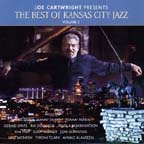 The
Best of Kansas City Jazz Vol. 2 The
Best of Kansas City Jazz Vol. 2
Lafayette Music
By Tom Ineck
Joe
Cartwright continues to mine the rich vein of Kansas City jazz
with a second volume of live recordings featuring the best of
KC’s contemporary music talent. While holding down his seat as
house pianist at several venues over the years, Cartwright has
documented a wealth of material, and with his latest release he
again shares the wealth with us.
Recorded in the Oak Bar at the InterContinental Kansas City at
the Plaza and at Jardine’s Restaurant and Jazz Club, “The Best
of Kansas City Jazz Vol. 2” is a generous package of nine tracks
totaling 70 minutes and ranging from instrumental and vocal
tunes to jazz standards and the blues. The versatile and
virtuosic Cartwright confidently drives the proceedings, with
bassist Gerald Spaits and drummer Ray DeMarchi usually providing
the rock-solid rhythm. Drummer Tommy Ruskin is on two tracks,
and bassist Tyrone Clark is present on one.
Even for those of us who are familiar with many of the city’s
jazz artists, there are a few pleasant surprises here, including
the opening track, “Bluesville,” with the exciting and
imaginative guitarist Wayne Goins playing in a style reminiscent
of Wes Montgomery, but totally his own. Also adept at the blues,
Cartwright adds to the excitement.
Duck Warner handles the vocals on “You’d Be So Nice to Come Home
To” with swinging panache, especially when his mellow baritone
swoops into the lower register. With a dramatic approach that
conjures images of the great Earl Bostic, alto saxophonist Kim
Park incites Cartwright to some of his best playing ever on the
bluesy “September Song.”
Among the other highlights here are Mike Metheny’s passionate
reading of “Angel Eyes” on flugelhorn, Ahmad Alaadeen’s snaking
soprano saxophone on the Victor Young tune “Delilah,” and
guitarist Danny Embrey tastefully stepping out on an uptempo
version of “Without a Song.” As always, Cartwright is a strong
accompanist throughout these recordings, but he’s also capable
of absolutely brilliant solo passages, as on “Without a Song”
and the 11-minute rendition of Johnny Mandel’s “Emily,” with
Park switching to flute. Spaits contributes inspired solos on
both tunes.
Given the depth and breadth of Kansas City’s vibrant jazz scene,
it is safe to say that we can expect more volumes of “The Best
of Kansas City Jazz.” And, as long at Cartwright is at the helm,
they will continue to delight listeners.
top |
|
|
|
PETER BOUFFARD & RUSTY WHITE
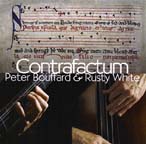 Contrafactum Contrafactum
By Tom Ineck
Lincoln jazz veterans Rusty White on bass and Peter Bouffard on
guitar make an ideal musical partnership on “Contrafactum.”
While the resulting music requires close attention, the listener
is amply rewarded.
Interweaving harmonic lines are the standard operating procedure
here. There also is the expected wit and wordplay, especially
from the bassist. For example, it was White’s idea to name his
opening composition “Nervous Sheep,” based on the harmony of
George Gershwin’s “Embraceable You” (or ewe).
The
playing turns deadly serious on the stately rendition of
Chopin’s Prelude in E minor, with White playing the theme on
bowed bass and Bouffard taking the accompanying role. Jobim’s
“Insensatez (How Insensitive)” gets a fairly conventional
treatment. In his liner notes, Bouffard astutely notes the
obvious similarity of this classic jazz tune to the previous
piece by Chopin.
With his clever “Trois Petit Pas,” Bouffard takes his
inspirational cue from Coltrane’s “Giant Steps,” slowing the
tempo to waltz time. White turns in a brilliant solo.
“Channeling” is saxophonist Jerry Bergonzi’s fascinating
restructuring of the standard “Alone Together.” White walks the
bass as Bouffard tackles the difficult changes. As the title
implies, Mike Stern’s “Mood Swings” features a swinging blues
pattern front and center.
“Gisella” is Bouffard’s nod to a former Boston landlady of the
same name. It employs the harmonic progression of Henry
Mancini’s “Days of Wine and Roses,” but it may not be
immediately obvious. “Contrapunctus” is another difficult
Bouffard piece, this one based on “Autumn Leaves.” The two
musicians again display their innate compatibility while
asserting their individuality.
Hoagy Carmichael’s gorgeous “Skylark” is the perfect vehicle for
a solo bass performance, and White gives it everything he’s got,
offering stunning variations on the changes. Likewise,
Bouffard’s choice for solo guitar, “It Could Happen to You,” is
apt, and he handles it flawlessly with interweaving melody, bass
and rhythm lines.
From start to finish, “Contrafactum” is a local product. It was
recorded, mixed and mastered by longtime Lincoln recording
engineer Tom Larson. The liner photographs were taken by David
Dale and the graphic design was done by Reynold Peterson, both
well-known Lincoln favorites. Bouffard himself gets credit for
production and for the liner notes, which are relentlessly
instructive but occasionally veer into technical territory
designed for scholars only.
top |
|
|
|
ENRICO RAVA QUINTET
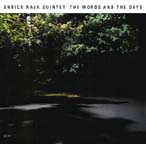 The
Words and the Days The
Words and the Days
ECM Records
By Tom Ineck
The
myth surrounding ECM Records says that the Munich-based company
has been churning out cold, emotionless music since its
inception in 1969, that the European approach to jazz that is
exemplified by ECM is diametrically opposed to the original,
blues-drenched roots of the music.
Hair-splitting arguments over structure and style, political
intent or racial purity of jazz recordings have always bored me.
On the other hand, much of the music produced by ECM records
over the last 40 years deeply moves me, including “The Words and
the Days,” a 2007 release by Italian trumpeter Enrico Rava.
Rava, now 68, began his recording career more than 35 years ago.
He began his tenure with ECM in 1972, with the similarly titled
“The Pilgrim and the Stars.” He has been creating haunting,
singular music ever since. Blessed with a beautiful trumpet tone
and phrasing that owes much to mid-‘60s Miles Davis and Chet
Baker, Rava continues to blaze a unique trail on “Words and
Days.”
The
rest of this compatible quintet is comprised of Gianluca
Petrella on trombone, Andrea Pozza on piano, Rosario Bonaccorso
on bass and Roberto Gatto on drums. Their telepathic interaction
makes for a very lively and sure-footed sound, even when the
tempos increase as on the swinging “Echoes of Duke” or the cover
of trumpeter Don Cherry’s enchanting “Art Deco.”
Indeed, it is at the slower tempos that the quintet’s musical
conversations are best appreciated, including the opening title
track, Russell Freeman’s “The Wind,” and original Rava
compositions like “Tutu,” “Todamor,” the snaking “Serpent” and
the closer, “Dr. Ra and Mr. Va.”
Contrasting with most of the horn-dominated session, Bonaccorso
contributes the lovely bass solo, “Sogni proibiti,” and Gatto
wrote the whimsical “Traps.” Petrella and Pozza also contribute
much to the overall sound, with pithy and provocative solos and
accompaniment, especially on the final track.
Rava, whose resume runs the gamut from early Dixieland-style
playing to the avant-garde sounds of his work with Steve Lacy,
Roswell Rudd, Marion Brown and Cecil Taylor, remains the
predominant voice throughout this recording. As he nears age 70,
he continues to amaze with his power, control and technique.
“The Words and the Days” is a generous 73 minutes long, a lush
musical paradise in which to lie back and relax, where the
imagined words are sheer poetry and the days seem a little more
forgiving.
top |
|
|
|
ANAT FORT
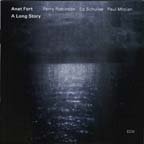 A
Long Story A
Long Story
ECM Records
By Tom Ineck
“A
Long Story” by young Israeli pianist and composer Anat Fort is
another recent ECM release that seems to reinforce the critical
stereotype of cerebral piano music that has long exemplified the
label’s muse. Some may want to blame Keith Jarrett for starting
the whole thing nearly 35 years ago, but I prefer to thank
Jarrett for his influence on Fort’s wonderful ECM debut.
Like Jarrett, Fort brings together elements of classical
composition and free jazz improvisation, along with her insight
into the ethnic music of her native Mideast. Her choice of
sidemen reinforces that mix of the avant-garde and the ethnic,
with Perry Robinson on clarinet and ocarina, Ed Schuller and
bass and the legendary Paul Motian (a former Jarrett sideman) on
drums.
The
recording has the inevitable flow of a suite, though employing
different tempos and instrumentation. It is neatly tied together
with three thematically continuous compositions—the opener,
“Just Now, Var. I,” the fifth track, “Just Now, Var. II” and the
closer, “Just Now, Var. III.” The repetitive structure is no
coincidence. It brilliantly enhances the hour-long listening
experience by subtle association.
Those repeated themes, however, are not the only memorable
moments. “Morning: Good” is a stunningly beautiful composition
with an inspired Schuller bass solo. Robinson delivers a lovely,
lilting clarinet solo on “Lullaby.”
In
contrast, there are elements of sonic dissonance, as in “Chapter
Two,” which for some reason precedes “Chapter One.” Fort and
Robinson searchingly play against each other’s harmonies on “Not
a Dream?” On “Unhaired,” Fort and Schuller meet in unison lines,
while Motian blazes a typically bold, but solitary trail on the
drum kit.
“As
Two/Something ‘Bout Camels” is the most overtly political piece,
written in response to the escalating tensions between Israeli
and Palestinian factions. Like most conflicts, the tune moves
through chaos to a sort of resolution, however tentative. “Not
the Perfect Storm” is, likewise, chockfull of musical sturm und
drang that eventually finds release in Fort’s cascading
summation.
Recorded in March 2004 and not released until 2007, it’s a pity
that “A Long Story” took so long to see the light of day. Even
so, it is a story worth hearing again and again. Fort expresses
her satisfaction with the recording thusly: “This record to me
is a journey of heaven and earth coming together with joy.”
top |
|
|
|
BILL BRUFORD / MICHIEL BORSTLAP
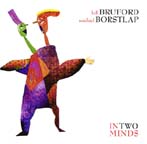 In
Two Minds In
Two Minds
Summerfold Records
By Tom Ineck
Kudos go to veteran rock and jazz drummer Bill Bruford for his
continuing expression of artistic freedom and for his business
savvy in developing Summerfold Records as a place for musicians
of like mind to practice their improvisatory craft.
“In
Two Minds” pairs Bruford with Dutch keyboardist Michiel Borstlap
on 12 tracks recorded at four concerts, two in Norway and two in
the U.K. The live nature of these sessions gives the collective
improvisation its essential edge.
The
opener, “Kinship,” declares the shared impulses of these two
musical adventurers. Borstlap begins with a beautiful piano
passage, and Bruford responds with shimmering percussive shards
of sound. The title track swings with a jazzy exuberance,
setting Borstlap’s moody chords against the drummer’s shifting,
accelerating time.
“From the Source, We Tumble Headlong” is the apt title for a
frantic ramble with Borstlap doubling on acoustic piano and
electronic keyboards, sounding at times like Joe Zawinul at his
spaciest and most harmonically advanced. Bruford deftly keeps
stride and drives the tune with his usual combination of
technical skill and imagination.
On
“Flirt,” Bruford and Borstlap do, indeed, seem to tease each
other playfully with a funky call-and-response rapport. “Low
Tide, Camber Sands” has Bruford in subtle accompaniment as
Borstlap explores a lovely melodic invention ala Keith Jarrett.
As its title implies, “The Art of Conversation” is an effusive
and artful musical dialogue.
Playing the log drum in addition to the conventional trap set,
Bruford brings new tonalities to “Conference of the Bees.”
Bruford plays havoc around a simple piano chord progression on
“Sheer Reckless Abandon.” The two are at their most rapturous
and expansive on “The Odd One Out.”
The
only piece not composed by the two is their playful
interpretation of Miles Davis’ “All Blues.” In less than five
minutes, they manage to deconstruct and reinvent the classic
tune in ways never before imagined or realized.
With pieces ranging from three minutes to nearly eight minutes,
the mutual music-making is never forced or overplayed. Most
important, the interaction between Bruford and Borstlap never
lapses into bored repetition or predictability. These are two
musical conversationalists who truly enjoy each other’s company.
And they have plenty to say.
top |
|
|
|
MICHAEL BRECKER
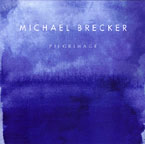 Pilgrimage Pilgrimage
Heads Up Records
By Tom Ineck
As
if this beautiful recording needed any more poignancy than is
contained in its inspired performances, “Pilgrimage” also is
Michael Brecker’s final document, recorded six months before his
death of leukemia in January and mixed just days after his
passing.
His
health failing with complications from the rare
blood disorder
myelodysplastic syndrome, Brecker set out to
make one last recording, enlisting the aide of close musical
compatriots Pat Metheny on guitar, Herbie Hancock (on four
tracks) and Brad Mehldau (on five tracks) alternating at the
keyboard, John Patitucci on bass and Jack DeJohnette on drums.
The result is a testament for the ages, devoid of maudlin
sentiment but nonetheless brimming with emotional impact.
Of
the nine original Brecker compositions, only one is a ballad.
The others churn and roil and burn with varying degrees of
intensity. The opener, “The Mean Time,” pits Brecker’s tenor
against Metheny’s guitar, line for line, with Hancock lending
jagged harmonic flourishes. Brecker’s early plaintive tone on
the lovely “Five Months from Midnight” subtly hints at
melancholy, but later he delivers an unmistakably defiant and
uplifting solo. The 10-minute “Anagram” is charged with
electricity, mightily powered by DeJohnette, Patitucci and
Metheny, who set the stage for a staggering tenor solo.
One
of the many highlights of this recording is “Tumbleweed,” a
lilting, breezy rocker with wordless vocal passages by
DeJohnette, an outstanding Metheny solo on guitar synthesizer,
and piano punctuation by Mehldau, leading into a transcendent
Brecker solo. Mehldau then delivers a wonderfully funky solo
before the ensemble returns to the powerful melody for an
ecstatic conclusion. By contrast, the poignant ballad “When Can
I Kiss You Again?” is the sole reference to Brecker’s illness, a
question from his teenage son during the time of his father’s
treatment when family members were not allowed to touch him.
Metheny and Hancock deliver breathtakingly tender solos in
preparation for the composer’s own heart-rending tenor
statement.
The
convoluted “Cardinal Rule” deftly alternates from Brecker’s
tenor to Mehldau’s piano to Patitucci’s solo and DeJohnette’s
driving percussion. Brecker and Metheny again join forces on the
theme for “Half Moon Lane,” a lyrical mid-tempo tune. “Loose
Threads” lopes and surges with ingeniously suspended stop-time
passages that create tension without losing the “thread.” The
title track, featuring Hancock on electric piano and Brecker
soloing on EWI and tenor, brings the proceedings to a close with
an appropriately spiritual mood.
Despite his progressing illness, Brecker throughout this
recording plays with seemingly boundless energy, pouring
torrents of notes in non-stop, improvised passages. Tracks range
from about seven minutes to more than 10 minutes, allowing
plenty of time for the excitement to spread among all the
players. It is, indeed, an inspiring musical “Pilgrimage” worthy
of many repeat visitations.
top |
|
|
|
ANDY BEY
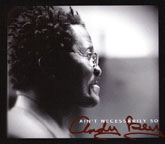 Ain’t
Necessarily So Ain’t
Necessarily So
12th Street Records
By Tom Ineck
In
the course of a career spanning nearly 50 years, singer-pianist
Andy Bey has been woefully under-recorded, so this release is a
welcomed addition to his oeuvre, even though it was recorded in
May 1997 and held from release for a decade.
Bey
first made a name for himself in the late 1950s and early 1960s
with Andy and the Bey Sisters, featuring siblings Salome and
Geraldine. Since they broke up 40 years ago, Bey has released
only five studio recordings—four in the 1990s—and “Ain’t
Necessarily So” is only the second live release.
Recorded May 13-15, 1997, at New York City’s legendary Birdland,
it contains some of Bey’s most impassioned singing and most
tasteful keyboard work, not to mention the rock-solid
accompaniment of bassist Peter Washington and drummer Kenny
Washington. “Ain’t Necessarily So” also is exquisitely produced,
making it an absolutely essential document of an artist whose
career has been inadequately documented.
Bey
gives the full soulful treatment to Gershwin’s title track, with
special emphasis on Ira’s cleverly rhymed biblical references.
With a voice that ranges over several octaves and is capable of
dramatic falsetto flights, Bey immediately establishes his
credentials. The obscure “Hey, Love,” by Mary Rodgers and Martin
Charnin, is a wonderful vehicle for Bey, as he tenderly caresses
each lyric and hangs on a single note for an eternity near the
end of this nine-minute masterpiece.
The
tempo rises for the Jerome Kern evergreen “All the Things You
Are.” Working in tandem with the fabulous rhythm section, Bey
percussively punctuates each lyric line, stretching and
repeating words and improvising phrases like a true bebop
master. Ellington’s gorgeous ballad “I Let a Song Go Out of My
Heart” has Bey in a sweet, crooning mood, softly voicing the
lyrics in falsetto, but not without soulful interjections.
Throughout the nine-minute performance, there is never a doubt
whether Bey believes the words. He seems to “live” them,
embodying their sentiment in passages half sung and half spoken,
with spontaneous cascades of blue notes.
“If
I Should Lose You” is an instrumental, with Kenny Washington
subtly driving the rhythm using brushes. Bey states the melody
on piano, following with playful, discordant variations on the
theme. The mood returns to the sublimely romantic with Cy
Coleman’s “On Second Thought,” in which Bey starkly demonstrates
his ability to tell a moving love story with intelligence and
total conviction.
Perhaps it is the swinging rendition of “Brother, Can You Spare
a Dime?” that best exemplifies how Bey puts all the pieces
together—vocal and keyboard technique, unique harmonic ideas,
blues inflection and humanity, as reflected in the Depression
Era theme that still remains timely in the 21st
century. The live recording ends as it began, with a Gershwin
classic. Bey, alone at the piano, takes “Someone to Watch Over
Me” at a very slow pace, drawing every drop of emotion from its
timeless lyric.
top |
|
|
|
THE HOT CLUB OF SAN FRANCISCO
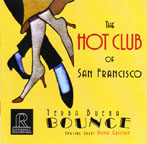 Yerba
Buena Bounce Yerba
Buena Bounce
Reference Recordings
By Tom Ineck
The
Hot Club of San Francisco celebrates its 15th year
and its 10th release with a recording stretching
across 17 tracks that go well beyond the one-hour mark and
feature several guest appearances.
Lest you forget the guiding principle behind the band, “Yerba
Buena Bounce” begins with a brief but blazing rendition of that
old gypsy jazz favorite, “Mystery Pacific,” by Django Reinhardt
and Stephane Grappelli, the undisputed pioneers of the genre.
Once their credentials have been established, leader Paul
Mehling and company slip into the comfortable mid-tempo swing of
“Hot Lips,” turning up the string intensity for more than four
minutes.
Mehling is joined by current Hot Club members, Evan Price on
violin, Jeff Magidson and Jason Vanderford on rhythm guitars and
Ari Munkres on bass.
The
Lennon-McCartney songbook has been represented in every
imaginable musical style, so the Hot Club’s rendition of “I’m
Happy Just to Dance With You” seems perfectly logical. Seth
Asarno adds an exotic flair on bandoneon. Special guest and
friend David Grisman lends his mandolin virtuosity to a blazing
version of “Sway.”
Also known as “Quien Sera,” the tune was a hit for Dean Martin
in 1954, but there’s no mistaking the Hot Club take for Dino’s.
Mehling’s original “Number Two” purportedly found its
inspiration while the composer was otherwise occupied in a
restroom in Iceland. It features a nice bass solo by Munkres.
The Grappelli ballad “Souvenir de Villingen” gets a lovely
treatment by Price. Lester Young’s whimsical “Tickle Toe” swings
with bluesy gusto. The rhythm guitars churn up the water and
Price soars high above them on “White and Black,” another
Reinhardt and Grappelli tune.
Grisman and Asarno are used to good effect on Mehling’s tender “Lullabye,”
with Grisman stating the lovely theme, followed by a bandoneon
solo. Mehling gleefully leads the charge on Reinhardt’s frantic
“Rhythm Futur,” and ups the ante with lead guitar flourishes on
his own composition “Yerba Buena Bounce,” which also features an
energetic solo by Price.
In
an unconventional arrangement, Munkres takes the lead on
“Stardust.” Walter Donaldson’s “Borneo” gets an aptly exotic
treatment with everyone stoking the rhythmic fire. The duo of
Mehling and Price make “Georgia Cabin” sound like home, sweet
home, and Mehling goes it all alone on Reinhardt’s
“Improvisation #2.”
In
a departure from form, two bonus tracks—“Gong Oh” and “Some of
These Days”—feature Mehling on vocals, accompanied by an
expanded Hot Club that includes Bill Carter on clarinet, Marc
Caprone on trumpet and Clint Baker on trombone and tuba. The
result veers close to traditional New Orleans jazz.
top |
|
|
|
EDDIE DANIELS
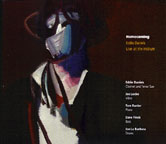 Homecoming:
Live at the Iridium Homecoming:
Live at the Iridium
IPO Recordings
By Tom Ineck
Double-threat reedman Eddie Daniels again scores a grand-slam
homer with “Homecoming,” his second release on IPO Recordings.
Stretching generously across two CDs, it documents a four-night
stand at the famed Iridium jazz club in New York City in October
2006.
Again alternating between tenor sax and clarinet, Daniels this
time is supported by a solid combo of veterans consisting of
vibraphonist Joe Locke, pianist Tom Ranier, bassist Dave Finck
and drummer Joe La Barbera. They prove very compatible
teammates, each able to confidently carry his weight in the jazz
group dynamic. And they swing!
Exploding from the starting gate, Daniels lunges—Sonny
Rollins-style—into an uptempo “Falling in Love with Love” at a
full gallop on tenor sax, daring the others to follow, and they
do so admirably. In his solo, Locke bears down on the vibes as
the rhythm section keeps the pace. La Barbera is especially
impressive.
Ranier’s “Resolution” is a jaunty, mid-tempo tune that proves an
excellent vehicle for Daniels’ clarinet, with vibes doubling.
The tenor sax brings appropriate warmth to the ballad “Not
Alone.” Finck’s deeply resonant bass anchors the light, bouncy
“Under the Wire,” as clarinet, vibes and piano blend and weave
lines almost imperceptibly while the tempo escalates.
The
ensemble aptly pays tribute to the stately sound of the Modern
Jazz Quartet with Roger Kellaway’s “Déjà VU MJQ,” adding
Daniels’ lyrical clarinet to the MJQ-patented instrumentation of
piano, vibes, bass and brush-stroked percussion. Daniels, on
tenor, gives Ellington’s luscious “Warm Valley” the elegant
treatment it deserves, weaving intricate lines against the
harmonic backdrop created by Ranier and Locke. Daniels turns the
tenor every which way but loose on a lively rendition of Cole
Porter’s “Night and Day,” which also features a dazzling solo by
Locke.
Many of the 15 tracks stretch beyond seven minutes, with John
Lewis’ classic “Django” expanding to more than 14 minutes as its
various themes develop and resolve. Daniels himself contributes
several worthy compositions, including the lovely ballad “Love’s
Long Journey,” the frantically paced “That’s for Afta,” and the
wistful closer, “Chosen Words,” a clarinet ballad of uncommon
beauty.
To
ensure radio play, the package also contains bonus edits of
“Django,” “That’s for Afta,” and “Falling in Love with Love.”
top |
|
|
|
CHARLIE HADEN & ANTONIO FORCIONE
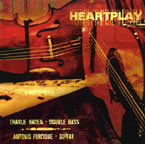 Heartplay Heartplay
Naim Audio
By Tom Ineck
Charlie Haden’s penchant in recent years for moody ballads
performed in duo collaborations, usually with pianists or
guitarists, has drawn undeserved criticism from some quarters.
On the contrary, his recordings with pianist Hank Jones (“Steal
Away”), pianist Kenny Barron (“Night and the City”), guitarist
Pat Metheny (“Beyond the Missouri Sky”), pianist Chris Anderson
(“None But the Lonely Heart”) and pianist Gonzalo Rubalcaba
(“Nocturne”) are some of the most finely crafted and eminently
listenable projects of the bassist’s 50-year career.
Add
2006’s “Heartplay” to the list. The sensitivity that Haden and
Italian guitarist and composer Antonio Forcione bring to their
playing and writing makes them a perfect pair. Haden contributed
three originals while Forcione wrote four tunes, beginning with
the opener, “Anna” and continuing with “If…,” a lovely melody
that Forcione has recorded before. Haden’s Spanish-tinged “La
Pasionaria” dates from 1982’s “The Ballad of the Fallen,” by the
bassist’s Liberation Music Orchestra. With his dazzling
fretwork, Forcione gives it an aptly impassioned flair.
Throughout this evocative recording, emotion is the key.
Forcione’s “Snow” is perfectly suited for fireside listening
this winter, and Haden’s haunting “Silence” (also from “The
Ballad of the Fallen”) is paced with stately grace. The only
cover is Fred Hersch’s “Child’s Song,” a playful tune
reminiscent of Haden-penned folk melodies and especially well
suited to Forcione’s lyricism.
The
brief “Nocturne” was written by the guitarist, but is equally
appealing to Haden’s romantic sense. From the most distant past
comes Haden’s “For Turiya,” first recorded by the bassist in the
1970s. Here, it is given a searching, 11-minute treatment that
is dominated by the composer’s resonant, and uniquely plangent
bass lines. Haden drops out long enough to allow Forcione a
heartfelt solo statement, before bringing the tune and the
recording to a satisfying close.
top |
|
|
|
PAUL BOLLENBACK
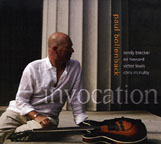 Invocation Invocation
Elefant Dreams Records
By Tom Ineck
Guitarist Paul Bollenback established a stellar reputation
during his long tenure with organist Joey DeFrancesco in the
1990s. Over the last decade, he has blazed his own stylistic
trail with seven recordings as leader. For his latest effort,
“Invocation,” Bollenback gathered an all-star band in a tribute
to fallen jazz legends.
Bassist Ed Howard and drummer Victor Lewis comprise the rhythmic
core around which Bollenback erects his fretwork constructions.
Trumpeter Randy Brecker contributes his usual expertise on
several tracks, and Chris McNulty adds occasional flourishes of
vocalise.
Without specific references to musical heroes who have passed,
the set opens with Bollenback’s own “Dancing Leaf,” employing
the guitarist’s trademark exotic chord progressions and unique
sense of time. The beautiful “Alter Ego,” by the late pianist
James Williams, features McNulty’s crystal-clear voice against
Brecker’s bright trumpet lines. “How Deep is the Ocean” gets an
unconventional reading with blues-inflected guitar, a smooth
shuffle rhythm and tasteful solo statements by Howard and Lewis.
Perhaps the most evident reference to time and mortality is the
ballad “Everything Must Change,” and Bollenback, with subtle
assistance by Howard and Lewis, does it justice.
Of
course, the centerpiece is the two-part, 11-minute “Invocation,”
weaving guitar, trumpet and voice in an eerie sound tapestry.
Pitched at approximately the same range, the three seem to clash
uncomfortably before eventually finding resolution, perhaps a
metaphor for the uneasy relationship between life and death.
The
proceedings return to more conventional ground for Johnny
Mandel’s gently waltz “Emily.” Bollenback explores interesting
harmonic variations and exhibits some lovely Wes
Montgomery-inspired playing before returning to the theme.
Bollenback’s own composition “Songline” sings with appropriate
lyricism and passion as the trio escalates the tempo. Coltrane’s
classic “After the Rain” closes the set with the spiritual
clarity suggested by the title. Brecker states the simple melody
on his horn as Bollenback improvises with soulful guitar
flourishes.
top |
|
|
|
The Fred
Hersch Trio
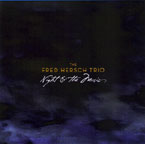 Night
& the Music Night
& the Music
Palmetto Records
By Tom Ineck
Fred Hersch has long been among
the first rank of jazz pianists following in the hallowed
footsteps of Bill Evans, alternating dazzling improvised runs
with heart-wrenching ballads. Despite his prolific recording
output—some 30 releases in little more than 20 years—he has
carved out a singular reputation for consistently high-quality
performances, whether in the format of solo keyboard, trio or
larger ensemble.
With 2007’s “Night & the Music,”
his sixth release on Palmetto, Hersch continues that sterling
record for excellence, with longtime bandmate Drew Gress on bass
and drummer Nasheet Waits. It is typical Hersch, with a tasteful
mix of originals, several standards and a couple of tunes by
Thelonious Monk. It is, however, Hersch’s first studio trio
recording since 1994’s “Fred Hersch Trio Plays…,” and that makes
it essential listening.
Cole Porter’s “So in Love”
begins tentatively before accelerating to an insistent Latin
tempo. The haunting original “Rhythm Spirit,” with its swirling
convolutions, is dedicated to drummer Billy Hart, while Hersch
composed the lovely “Heartland” for pianist Art Lande.
For the “title” track, “You and
the Night and the Music,” Hersch wrote a brief introductory
passage he calls “Galaxy Fragment,” which seems to gently launch
the listener into outer space, where the moon and stars seem
within one’s grasp. The Dietz/Schwartz classic is thus
transformed into a spacey rendezvous, with an appropriately soft
landing. On the other hand, Monk’s playful “Boo Boo’s Birthday”
sidesteps, crabwise, with jagged leaps and bounds.
The trio’s take on “Change
Partners” continues the terpsichorean tendency, as Waits seems
to dance lightly across the full range of drums and cymbals,
accompanied by Gress’ bounding bass and Hersch’s acrobatic
keyboard excursions. Berlin returns with a tender and relatively
straightforward rendition of “How Deep is the Ocean.”
“Gravity’s Pull” is a wonderful
Hersch melody that evolves kaleidoscopically in brilliant
keyboard patterns. Gress composed the ballad “Andrew John,” with
the bass ringing the stately changes. Monk’s “Misterioso” seems
an apt closer to a beautifully mysterious recording.
According to Hersch, seven of
the 10 tracks were captured on the first take, a testament to
the trio’s compatibility and powers of collective interplay.
Waits is a true percussionist, always creating the most
appropriate rhythmic “colors” for the occasion, and Gress is
virtually telepathic in his artistic simpatico.
top |
|
|
|
ALAADEEN
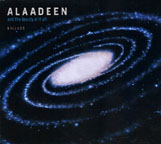 And
the Beauty of It All: Ballads And
the Beauty of It All: Ballads
ASR Records
By Butch Berman
Kansa City’s pure treasure, reedman
personified Alaadeen is one of my best friends in the jazz biz
and in the world. Even if I didn’t know him as well as I do, I’d
still consider him to be one of the most prolific disciples of
John Coltrane.
He’s a beautiful cat, spiritual
and a deep thinker whose musical talent has great healing
potential as well as being most entertaining. His lovely tribute
to my wife, Grace, on his last CD release, “New Africa Suite,”
was one of the finest jazz outpourings of 2006. On his latest
project, “And the Beauty of It All,” he’s moved up another notch
in creating a piece of work that touches you with loving warmth
that radiates throughout your entire body and soul, a most
splendid creation and most beautiful, indeed.
Alaadeen captures what is most
essential in the treasured art form we call jazz, a CD so full
of love I recommend it for lovers only, as it totally transcends
from the heart into our systems, making us, the listeners, truly
appreciate what “the beauty of it all” is all about. We’re both
a couple of older cats that have beaten the odds of a variety of
health issues that seem to go with the adventure of aging.
Live to be 100 and a day, my friend, as your music is the tonic
that rejuvenates us all and makes every new day a pleasure to
breathe in God’s love and the beauty of it all. A must for
everyone’s Xmas shopping lists, or any time of the year.
top |
|
|
|
LES
DeMERLE BAND
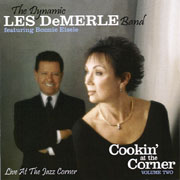 Cookin’
at the Corner, Vol. 2 Cookin’
at the Corner, Vol. 2
Origin Records
By Butch Berman
One of my fave labels in the biz
is Origin, out of the great Northwest, which sends me a huge
portion of their vast and fabulous catalogue on a regular basis.
While I was recovering from by first bout of illness in early
October, this wonderful new recording of “Cookin’ at the Corner,
Vol. 2” by The Dynamic Les DeMerle Band arrived and was brought
to my hospital bedside by my precious wife, Grace, with her
portable Bose CD player.
I dug it from the first listen,
and it truly played a big part in my speedy recovery. It’s a
swinging five-piece band led by the terrific drummer and singer
Les DeMerle, and featuring his lovely vocalist and wife, Bonnie
Eisele, as well as bassist Ricky Ravelo and piano player Mike
Levine, all out of Florida, I believe. Every track is a winner,
from “In a Mellow Tone” to “Our Love is Here to Stay” to great
instrumental classics like Nat Adderley’s “Work Song” and the
Juan Tizol immortal “Caravan.”
There are beautiful renditions
of “I’m beginning to See the Light,” as well as “S’Wonderful,”
“Do You Know what It Means to Miss New Orleans?” “Let’s Fall in
Love,” “How High the Moon” and “Autumn Leaves.” An outta sight
finale of “Jumpin’ with Symphony Sid” rocked and swung me back
into good health. When I arrived home, I immediately got on
Amazon and ordered every other Les DeMerle CD available. I
suggest that after you hear “Cookin” at the Corner, Vol. 2,”
done live, you’ll follow suit.
In fact, this band knocked me
out so much I brought them to the attention of the committee for
Lincoln’s annual Jazz In June series, so the Berman Music
Foundation is back in the mix for this upcoming 2008 season.
Looks like the committee members all dug the shit out of ‘em,
too, so expect to see this incredible group live either the
second or last Tuesday of June, an event not to be missed!
I had fun chats with both Les
and Bonnie, so you’ll be reading more about them in the spring
edition of my Jazz newsletter, as well as
hopefully hear their music and some interviews with them, if I
get my jazz show back on the air, which I’m working on, sometime
in early 2008. Stay tuned here for all the groovy details. It’s
truly one hell of a great band. Check them out NOW, and you’ll
thank me for this info in the near future, I’m sure. I can’t
wait to hear them live. Get on it, jazz fans. These cats are TOO
MUCH! Check out Origin’s website at www.origin-records.com or
call them at (206) 781-2589. Xmas is just around the corner, ya
know, and this music is good any time.
top |
|
|
|

 Imagina
Imagina Monday Night Live at the Village Vanguard
Monday Night Live at the Village Vanguard Season of Changes
Season of Changes Joe Lovano,
Dave Liebman, Ravi Coltrane
Joe Lovano,
Dave Liebman, Ravi Coltrane Live
at the Bird’s Eye
Live
at the Bird’s Eye Air
Air Trinity
Trinity Present
Tense
Present
Tense The
Song Is You
The
Song Is You Future
Day
Future
Day Serve
or Suffer
Serve
or Suffer You
Decide
You
Decide Raya
Yarbrough
Raya
Yarbrough Out
of the Blues
Out
of the Blues For
Sentimental Reasons
For
Sentimental Reasons In
the Moment
In
the Moment The
Best of Kansas City Jazz Vol. 2
The
Best of Kansas City Jazz Vol. 2 Contrafactum
Contrafactum The
Words and the Days
The
Words and the Days A
Long Story
A
Long Story In
Two Minds
In
Two Minds Pilgrimage
Pilgrimage Ain’t
Necessarily So
Ain’t
Necessarily So Yerba
Buena Bounce
Yerba
Buena Bounce Homecoming:
Live at the Iridium
Homecoming:
Live at the Iridium Heartplay
Heartplay Invocation
Invocation Night
& the Music
Night
& the Music And
the Beauty of It All: Ballads
And
the Beauty of It All: Ballads Cookin’
at the Corner, Vol. 2
Cookin’
at the Corner, Vol. 2